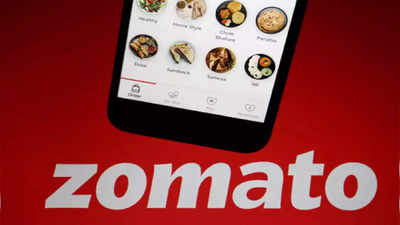NEW DELHI: Shares of
food tech unicorn
Zomato plummeted 12 per cent in the morning trade on Tuesday after the food delivery aggregator reported a 57.2 per cent drop in consolidated net profit for the December quarter to Rs 59 crore. The scrip of the company fell 11.81 per cent to Rs 212.50 apiece on the BSE.
On the NSE, shares of Gurugram-headquartered Zomato depreciated by 9.99 per cent to hit its lower circuit level of Rs 215.80 per piece.
On Monday, shares of Zomato settled more than 3 per cent lower on the bourses.
In two days, the company’s market capitalisation (mcap) got eroded by Rs 35,175.53 crore to Rs 2,04,876.94 crore.
Meanwhile, shares of Swiggy also declined over 10 per cent on the stock exchanges after its peer competitor Zomato reported a slowdown in its business.
On the BSE, Swiggy’s shares depreciated 10.47 per cent to trade at Rs 428.85 apiece. The scrip of the company decreased 9.91 per cent to Rs 431.70 per share on the National Stock Exchange (NSE).
Further, this is the biggest single-day drop for Swiggy’s shares since its listing last year.
However, Swiggy is yet to announce the date to declare its December quarter results.
The 30-share BSE Sensex slumped 710.60 points or 0.92 per cent to trade at 76,362.84, while NSE Nifty fell 141.85 points or 0.61 per cent to 23,202.90 in the morning trade.
On Monday, food tech unicorn Zomato reported a 57.2 per cent drop in consolidated net profit for the December quarter to Rs 59 crore, with its margins facing pressure due to aggressive store expansion to meet orders from its quick-commerce platform Blinkit.
The company had earned a net profit of Rs 138 crore in the year-ago period.
The company’s consolidated revenue from operations stood at Rs 5,405 crore, as against Rs 3,288 crore in the December quarter of the previous financial year.
However, during the quarter under review, Zomato’s total expenses also shot up to Rs 5,533 crore, from Rs 3,383 crore in the corresponding period of 2023-24.
The revenue-reporting segments for the group include India food ordering and delivery; hyperpure supplies (B2B business); quick commerce; Going out; and All other segments (residual).


